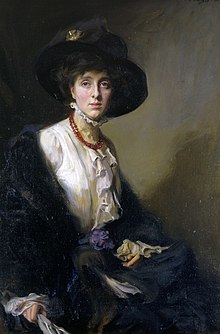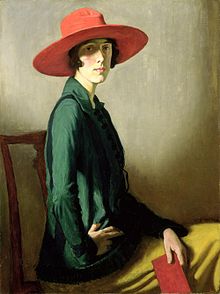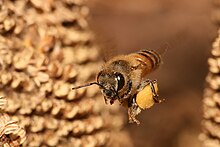Vita Sackville-West
Appearance

Victoria Mary Sackville-West, The Hon Lady Nicolson, CH (9 March 1892 – 2 June 1962), most famous as Vita Sackville-West, was an English poet, novelist and writer on gardening. She is sometimes considered part of the Bloomsbury group, and well known as the inspiration for Virginia Woolf's novel Orlando: A Biography.
Quotes
[edit]


Here the sweet legends of the world remain.




My heart and teach myself to feel
Only a sober tenderness
Where once was passion's loveliness.

To kill the body or destroy the soul?

And theirs presumably theirs, and cannot touch.
- Women, like men, ought to have their years so glutted with freedom that they hate the very idea of freedom.
- Letter to her husband Harold Nicolson (1 June 1919); published in Harold and Vita (1992), by Nigel Nicolson, p. 89
- Of course I have no right whatsoever to write down the truth about my life involving as it naturally does the lives of so many other people, but I do so urged by a necessity of truth-telling, because there is no living soul who knows the complete truth; here, may be one who knows a section; and there, one who knows another section: but to the whole picture not one is initiated.
- Autobiographical sketch (23 July 1920), published in Portrait of a Marriage : Vita Sackville-West and Harold Nicolson (1998), p. 3
- A man and his tools make a man and his trade.
- "A Saxon Song", in The Independent Vol. 110 (1923); also in Collected Poems (1934), p. 149
- A man and his land make a man and his creed.
- "A Saxon Song" (1923)
- A man and his loves make a man and his life.
- "A Saxon Song" (1923)
- The dusk is heavy with the wine's warm load;
Here the long sense of classic measure cures
The spirit weary of its difficult pain;
Here the old Bacchic piety endures,
Here the sweet legends of the world remain.- "Tuscany" in The Best Poems of 1923 (1924) edited by Thomas Moult
- Who could so watch, and not forget the rack
Of wills worn thin and thought become too frail,
Nor roll the centuries back —
And feel the sinews of his soul grow hale,
And know himself for Rome's inheritor?- "Tuscany" in The Best Poems of 1923 (1924) edited by Thomas Moult
- If I had only loved your flesh
And careless damned your soul to Hell,
I might have laughed and loved afresh,
And loved as lightly and as well,
And little more to tell.- "Song" in The Best Poems of 1923 (1924) edited by Thomas Moult
- It is incredible how essential to me you have become. I suppose you are accustomed to people saying these things. Damn you, spoilt creature; I shan't make you love me any the more by giving myself away like this — But oh my dear, I can't be clever and stand-offish with you: I love you too much for that. Too truly. You have no idea how stand-offish I can be with people I don't love. I have brought it to a fine art. But you have broken down my defences. And I don't really resent it.
- Letter to Virginia Woolf (21 January 1926), quoted in Love Letters : A Romantic Treasury (1996) by Rick Smith, p. 78
- It is quite true that you have had infinitely more influence on me intellectually than anyone, and for this alone I love you.
- Letter to Virginia Woolf (29 January 1927). as quoted in Granite and Rainbow : The Hidden Life of Virginia Woolf (2000) by Mitchell Leaska, p. 259
- It is necessary to write, if the days are not to slip emptily by. How else, indeed, to clap the net over the butterfly of the moment? for the moment passes, it is forgotten; the mood is gone; life itself is gone. That is where the writer scores over his fellows: he catches the changes of his mind on the hop. Growth is exciting; growth is dynamic and alarming. Growth of the soul, growth of the mind; how the observation of last year seems childish, superficial; how this year — even this week — even with this new phrase — it seems to us that we have grown to a new maturity. It may be a fallacious persuasion, but at least it is stimulating, and so long as it persists, one does not stagnate.
I look back as through a telescope, and see, in the little bright circle of the glass, moving flocks and ruined cities.- Twelve Days (1928) p. 9; part of this appears to have also become paraphrased in the form:
- Growth is exciting; growth is alarming. Growth of the soul, growth of the mind.
- As quoted in The Greatest Quotations of All-Time (2010) by Anthony St Peter, p. 281
- Growth is exciting; growth is alarming. Growth of the soul, growth of the mind.
- She walks among the loveliness she made,
Between the apple-blossom and the water—
She walks among the patterned pied brocade,
Each flower her son, and every tree her daughter.- "The Island", in Bulletin of the Garden Club of America (1929), p. 1, also in Collected Poems (1934), p. 54
- It was a real event in my life and my heart to be with you the other day. We do matter to each other, don't we? however much our ways may have diverged. I think we have got something indestructible between us, haven't we? … It has been a very strange relationship, ours; unhappy at times, happy at others; but unique in its way, and infinitely precious to me and (may I say?) to you.
What I like about it is that we always come together again however long the gaps in our meetings may have been. Time seems to make no difference.- Letter to Violet Trefusis (3 September 1950), published in The Other Woman : A Life of Violet Trefusis, including previously unpublished correspondence with Vita Sackville-West (1985) edited by Philippe Jullian and John Nova Phillips, p. 235
- I have come to the conclusion, after many years of sometimes sad experience, that you cannot come to any conclusion at all.
- In Your Garden Again (1953), p. 71 of 2004 edition
- And so it ends,
We who were lovers may be friends.
I have some weeks in which to steel
My heart and teach myself to feel
Only a sober tenderness
Where once was passion's loveliness.- "And so it ends", a poem cited as probably directed to her sister-in-law, Gwen St. Aubyn, in V. Sackville-West : A Critical Biography (1974) by Michael Stevens, p. 91
- You took me weak and unprepared.
I had not thought that you who shared
My days, my nights, my heart, my life,
Would slash me with a naked knife
And gently tell me not to bleed
But to accept your crazy creed.- "And so it ends", quoted in V. Sackville-West : A Critical Biography (1974) by Michael Stevens, p. 91
- Darling, I thought of nothing mean;
I thought of killing straight and clean.
You're safe; that's gone, that wild caprice,
But tell me once before I cease,
Which does your Church esteem the kinder role,
To kill the body or destroy the soul?- "And so it ends" quoted in V. Sackville-West : A Critical Biography (1974) by Michael Stevens, p. 91
- Days I enjoy are days when nothing happens,
When I have no engagements written on my block,
When no one comes to disturb my inward peace,
When no one comes to take me away from myself
And turn me into a patchwork, a jig-saw puzzle,
A broken mirror that once gave a whole reflection,
Being so contrived that it takes too long a time
To get myself back to myself when they have gone.- "Days I enjoy", quoted in Vita and Virginia: The Work and Friendship of V. Sackville-West and Virginia Woolf (1993) by Suzanne Raitt, p. 89
- And what have I to give my friends in the last resort?
An awkwardness, a shyness, and a scrap,
No thing that's truly me, a bootless waste,
A waste of myself and them, for my life is mine
And theirs presumably theirs, and cannot touch.- "Days I enjoy" quoted in Vita and Virginia: The Work and Friendship of V. Sackville-West and Virginia Woolf (1993) by Suzanne Raitt, p. 89
Orchard and Vineyard (1921)
[edit]- Yes, they were kind exceedingly; most mild
Even in indignation, taking by the hand
One that obeyed them mutely, as a child
Submissive to a law he does not understand.- "Bitterness"
- Remembrance clamoured in him: 'She was wild and free,
Magnificent in giving; she was blind
To gain or loss, and, loving, loved but me, — but me!- "Bitterness"
- All her youth is gone, her beautiful youth outworn,
Daughter of tarn and tor, the moors that were once her home
No longer know her step on the upland tracks forlorn
Where she was wont to roam.- "Mariana In The North"; also in Country Life Vol. 50 (1921), p. 738
- All her lovers have passed, her beautiful lovers have passed,
The young and eager men that fought for her arrogant hand,
And the only voice which endures to mourn for her at the last
Is the voice of the lonely land.- "Mariana In The North"
The Land (1926)
[edit]- Page numbers are of a 2004 edition




Will sense the opening of another year
And blunder out to seek another spring.
- I sing the cycle of my country's year,
I sing the tillage, and the reaping sing,
Classic monotony, that modes and wars
Leave undisturbed, unbettered, for their best
Was born immediate, of expediency.- Winter, p. 1
- Why should a poet pray thus? poets scorn
The boundaried love of country, being free
Of winds, and alien lands, and distances,
Vagabonds of the compass, wayfarers,
Pilgrims of thought, the tongues of Pentecost
Their privilege, and in the peddler's pack
The curious treasures of their stock-in-trade,
Bossy and singular, the heritage
Of poetry and science, polished bright,
Thin with the rubbing of too many hands;
Myth, glamour, hazard, fables dim as age,
Faith, doubt, perplexity, grief, hope, despair,
Wings, and great waters, and Promethean fire,
Man's hand to clasp, and Helen's mouth to kiss.
Why then in little meadows hedge about
A poet's pasture? shed a poet's cloak
For fustian? cede a birthright, thus to map
So small a corner of so great a world?- Winter, p. 4
- The country habit has me by the heart,
For he's bewitched for ever who has seen,
Not with his eyes but with his vision, Spring
Flow down the woods and stipple leaves with sun,
As each man knows the life that fits him best,
The shape it makes in his soul, the tune, the tone,
And after ranging on a tentative flight
Stoops like the merlin to the constant lure.- "Winter", p. 5
- Forget not bees in winter, though they sleep.
- "Bee-Master", p. 40
- In February, if the days be clear,
The waking bee, still drowsy on the wing,
Will sense the opening of another year
And blunder out to seek another spring.- "Bee-Master", p. 40
- All craftsmen share a knowledge. They have held
Reality down fluttering to a bench.- "Summer", p. 81
- I saw within the wheelwright’s shed
The big round cartwheels, blue and red;
A plough with blunted share;
A blue tin jug; a broken chair;
And paint in trial patchwork square
Slapping up against the wall;
The lumber of the wheelwright’s trade,
And tools on benches neatly laid,
The brace, the adze, the awl;- "Making Cider", p. 100
- The young men strained upon the crank
To wring the last reluctant inch.
They laughed together, fair and frank,
And threw their loins across the winch.- "Making Cider"
Kings Daughter (1929)
[edit]
Stare out between the bars.
Deserts are there, and the different skies,
And night with different stars.

Strong, steadfast, swift, eternally…
- The greater cats with golden eyes
Stare out between the bars.
Deserts are there, and the different skies,
And night with different stars.
They prowl the aromatic hill,
And mate as fiercely as they kill,
To roam, to live, to drink their fill;
But this beyond their wit know I:
Man loves a little, and for long shall die.- "The Greater Cats"
- Their strength's eternal in their sight,
They overtake the deer in flight,
And in their arrogance they smite;
But I am sage, if they are strong:
Man's love is transient as his death is long.- "The Greater Cats"
- I came from nowhere, and shall be
Strong, steadfast, swift, eternally:
I am a lion, a stone, a tree,
And as the Polar star in me
Is fixed my constant heart on thee.
Ah, may I stay forever blind
With lions, tigers, leopards, and their kind.- "The Greater Cats"
Collected Poems (1933)
[edit]
That might befall their beauty and their pride.

- Leopards on the gable-ends,
Leopards on the painted stair,
Stiff the blazoned shield they bear,
Or and gules, a bend of vair,
Leopards on the gable-ends,
Leopards everywhere.- "Leopards at Knole" p. 143
- Often on the painted stair,
As I passed abstractedly,
Velvet footsteps, two and three,
Padded gravely after me.
— There was nothing, nothing there,
Nothing there to see.- "Leopards at Knole", p. 143
- While many a lovely ship below sailed by
On unknown errand, kempt and leisurely;
And after each, oh, after each, my heart
Fled forth, as, watching from the Downs apart,
I shared with ships good joys and fortunes wide
That might befall their beauty and their pride…- "Sailing Ships", p. 162
Quotes about Sackville-West
[edit]
- Alphabetized by author
- I have been reading Grey Wethers—a magnificent book. The descriptions of the downs are as fine as any in the language. Such power! Such power! Not a pleasant book of course! But what English!
- Lord Curzon, remarks to Harold Nicolson recorded in Nicolson's letter to Vita Sackville-West (2 September 1923), quoted in Vita and Harold: The Letters of Vita Sackville-West and Harold Nicolson 1919–1962, ed. Nigel Nicolson (1992), p. 123
- Her appearance was indeed remarkable — strange almost beyond the reach of adjectives … She resembled a puissant blend of both sexes — Lady Chatterley and her lover rolled into one.
- Peter Quennell, in Customs and Characters (1982) p. 41
- Instantly the usual exciting devices enter my mind: a biography beginning in the year 1500 & continuing to the present day, called Orlando: Vita; only with a change about from one sex to the other.
- Virginia Woolf, on Vita being the inspiration for her novel Orlando : A Biography in her journal entry upon conceiving it (5 October 1927), quoted in The Virginia Woolf Reader (1984) edited by Mitchell Alexander Leaska, p. 315
- Suppose Orlando turns out to be about Vita; and its all about you and the lusts of your flesh and the lure of your mind (heart you have none, who go gallivanting down the lanes with Campbell) — suppose there's the kind of shimmer of reality which sometimes attaches to my people, as the lustre on an oyster shell (and that recalls another Mary) suppose, I say, that Sibyl next October says "There's Virginia gone and written a book about Vita" … Shall you mind?
- Virginia Woolf, in a letter to Sackville-West (10 October 1927), published in Vita : The Life of V. Sackville-West (1985) by Victoria Glendinning


